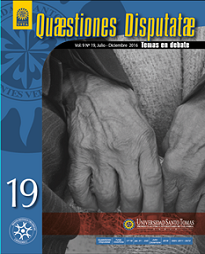Research in the Classroom: learning of irracional numbers
Main Article Content
Abstract
This article describes an experience with the charaterization of mathematical thoughts of the 8th grade students. This is made through the investigation in the classroom for learning irrational numbers. The article is the result of an investigation for the construction of the concept of irrational numbers from the social practices and the interaction in the classroom from the students as well as the teachers. The research is based on group activities, where knowledge is given through interaction in the groups and from the exploration of the surroundings. To do the analysis several activities were made. This was made with a group of students where each one summarized the steps followed to develop the activity. The results obtained were analized highlighting the case stories presented, especially the ones related to irrational numbers. The results allow to define that the group work makes a better construction of learning mathematics.
Article Details
How to Cite
Fuentes, E., & Saiz-Sáenz, M. L. (2016). Research in the Classroom: learning of irracional numbers. Quaestiones Disputatae: Temas En Debate, 9(19), 46-63. Retrieved from http://revistas.ustatunja.edu.co/index.php/qdisputatae/article/view/1109
Section
Artículos Núm. 19
De acuerdo a la Licencia Creative Commons Atribución-No Comercial-Sin Derivar 4.0 Internacional, se autoriza leer, descargar, copiar, distribuir, imprimir, buscar o enlazar los textos completos de estos artículos, siempre y cuando se conceda el crédito a los autores de los textos y a la Revista Quaestiones Disputatae: temas en debate, como fuente de publicación original. No se permite el uso comercial de copia o distribución de contenidos, así como tampoco la adaptación, derivación o transformación alguna de estos sin la autorización previa de los autores y de la dirección de Quaestiones Disputatae: temas en debate.

Esta obra está bajo una licencia de Creative Commons Reconocimiento-NoComercial-SinObraDerivada 4.0 Internacional.
References
Cantos, R. y et. al. (1994). El niño: Desarrollo y proceso de construcción del conocimiento. México D.F: Antología básica
Castro, E. (1991). Resolución de problemas aritméticos de comparación multiplicativa. Granada, España: Universidad de Granada.
Fiorentini, D. y Cristovão, E. M. (2010). Histórias e Investigações de/em Aulas de Matemática, Campinas. Brasil: Alínea.
Marín, F. E. (2015). La Udproco como mediación pedagógica para la enseñanza y el aprendizaje de las operaciones algebraicas fundamentales en grado octavo desde la perspectiva de la educación matemática crítica (Tesis de maestría). Universidad Nacional, Manizales, Colombia.
Ministerio de Educación Nacional (2006). Estándares Básicos de Competencias en Lenguaje, Matemáticas, Ciencias y Ciudadanas. Recuperado de http://www. mineducacion.gov.co/1759/articles-340021_recurso_1.pdf
Montiel, G. y Buendía, G. (Diciembre de 2011). Propuesta metodológica para la investigación socio-epistemológica, Memoria de la XIV escuela de invierno en Matemática educativa 2011, Zacatecas, México.
Moreira, P. C. (2004). O conhecimento matemático do professor: formação na licenciatura e prática docente na escola básica, Ano de obtenção (tesis de Doctorado). Universidad Federal de Minas Gerais, UFMG, Brasil.
Luque, M. F. (1995). Experiencias en la resolución de problemas en el aula de secundaria. Granada, España.
Ponte, J. P. y Brocado, J. y Oliveira H. (2006). Investigação Matemática na sala de aula. Belo Horizonte, Brasil: Autêntica.
Polya, G. (1979). Cómo plantear y resolver problemas. México D. F., México: Trillas México.
Porlán, A. R. (1987). El maestro como investigador en el aula: Investigar para conocer, conocer para enseñar. Investigación en la escuela, 1(1) ,63-70.
Castro, E. (1991). Resolución de problemas aritméticos de comparación multiplicativa. Granada, España: Universidad de Granada.
Fiorentini, D. y Cristovão, E. M. (2010). Histórias e Investigações de/em Aulas de Matemática, Campinas. Brasil: Alínea.
Marín, F. E. (2015). La Udproco como mediación pedagógica para la enseñanza y el aprendizaje de las operaciones algebraicas fundamentales en grado octavo desde la perspectiva de la educación matemática crítica (Tesis de maestría). Universidad Nacional, Manizales, Colombia.
Ministerio de Educación Nacional (2006). Estándares Básicos de Competencias en Lenguaje, Matemáticas, Ciencias y Ciudadanas. Recuperado de http://www. mineducacion.gov.co/1759/articles-340021_recurso_1.pdf
Montiel, G. y Buendía, G. (Diciembre de 2011). Propuesta metodológica para la investigación socio-epistemológica, Memoria de la XIV escuela de invierno en Matemática educativa 2011, Zacatecas, México.
Moreira, P. C. (2004). O conhecimento matemático do professor: formação na licenciatura e prática docente na escola básica, Ano de obtenção (tesis de Doctorado). Universidad Federal de Minas Gerais, UFMG, Brasil.
Luque, M. F. (1995). Experiencias en la resolución de problemas en el aula de secundaria. Granada, España.
Ponte, J. P. y Brocado, J. y Oliveira H. (2006). Investigação Matemática na sala de aula. Belo Horizonte, Brasil: Autêntica.
Polya, G. (1979). Cómo plantear y resolver problemas. México D. F., México: Trillas México.
Porlán, A. R. (1987). El maestro como investigador en el aula: Investigar para conocer, conocer para enseñar. Investigación en la escuela, 1(1) ,63-70.

